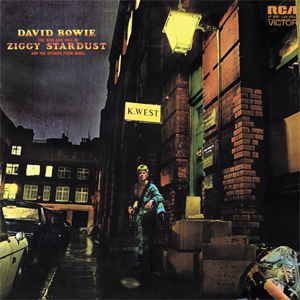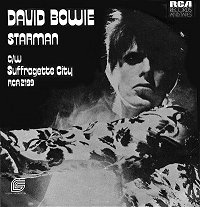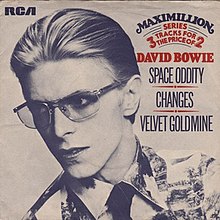
The Rise and Fall of Ziggy Stardust and the Spiders from Mars is the fifth studio album by the English musician David Bowie, released on 16 June 1972 in the United Kingdom through RCA Records. It was co-produced by Bowie and Ken Scott and features Bowie's backing band the Spiders from Mars — Mick Ronson (guitar), Trevor Bolder (bass) and Mick Woodmansey (drums). It was recorded from November 1971 to February 1972 at Trident Studios in London.

Aladdin Sane is the sixth studio album by the English musician David Bowie, released in the United Kingdom on 19 April 1973 through RCA Records. The follow-up to his breakthrough The Rise and Fall of Ziggy Stardust and the Spiders from Mars, it was the first album he wrote and released from a position of stardom. It was co-produced by Bowie and Ken Scott and features contributions from Bowie's backing band the Spiders from Mars — Mick Ronson, Trevor Bolder and Mick Woodmansey — with the pianist Mike Garson, two saxophonists and three backing vocalists. Recorded in London and New York City between legs of the Ziggy Stardust Tour, the record was Bowie's final album with the full Spiders lineup.

"Suffragette City" is a song by the English singer-songwriter David Bowie. It was originally released in April 1972 as the B-side of the single "Starman" and subsequently appeared on his fifth studio album The Rise and Fall of Ziggy Stardust and the Spiders from Mars (1972). The song was later reissued as a single in 1976, with the US single edit of "Stay" as the B-side, to promote the compilation album Changesonebowie in the UK. Co-produced by Bowie and Ken Scott, it was recorded by Bowie at Trident Studios in London with his backing band the Spiders from Mars, consisting of Mick Ronson, Trevor Bolder and Mick Woodmansey, at a late stage of the album's sessions. The song was originally offered to English band Mott the Hoople, who declined it and recorded Bowie's "All the Young Dudes" instead. It is a glam rock song that is influenced by the music of Little Richard and the Velvet Underground. The lyrics include a reference to Anthony Burgess' novel A Clockwork Orange and the lyric "Oooohh wham bam, thank you, ma'am".

"Starman" is a song by the English musician David Bowie. It was released on 28 April 1972 by RCA Records as the lead single of his fifth studio album The Rise and Fall of Ziggy Stardust and the Spiders from Mars. Co-produced by Ken Scott, Bowie recorded the song on 4 February 1972 at Trident Studios in London with his backing band known as the Spiders from Mars – comprising guitarist Mick Ronson, bassist Trevor Bolder and drummer Mick Woodmansey. The song was a late addition to the album, written as a direct response to RCA's request for a single; it replaced the Chuck Berry cover "Round and Round" on the album. The lyrics describe Ziggy Stardust bringing a message of hope to Earth's youth through the radio, salvation by an alien "Starman". The chorus is inspired by "Over the Rainbow", sung by Judy Garland, while other influences include T. Rex and the Supremes.

"John, I'm Only Dancing" is a song by the English musician David Bowie, originally released as a non-album single on 1 September 1972. It is a glam rock and R&B song with lyrics that describe a situation in which the narrator informs his lover not to worry about the girl he is with because he is "only dancing" with her. Although ambiguous, many commentators interpreted it as concerning a gay relationship. Recorded in London in June 1972, it was promoted with a low-budget promotional video directed by Mick Rock. It reached number 12 in the UK; RCA refused to release it in America due to its suggestive lyrical content.

"Rock 'n' Roll Suicide" is a song by the English singer-songwriter David Bowie, originally released as the closing track on the album The Rise and Fall of Ziggy Stardust and the Spiders from Mars on 16 June 1972. Co-produced by Ken Scott, Bowie recorded it with his backing band the Spiders from Mars – comprising Mick Ronson, Trevor Bolder and Mick Woodmansey. It detailed Ziggy's final collapse like an old, washed-up rock star and, as such, was also the closing number of the Ziggy Stardust live show. In April 1974 RCA issued it as a single.

Michael "Woody" Woodmansey is an English rock drummer best known for his work in the early 1970s as a member of David Bowie's core backing ensemble that became known as the Spiders from Mars in conjunction with the release of Bowie's 1972 LP The Rise and Fall of Ziggy Stardust and the Spiders from Mars. With the death of Bowie in January 2016, Woodmansey became the last surviving member of the Spiders.
"The Width of a Circle" is a song written by the English musician David Bowie in 1969 for his 1970 album, The Man Who Sold the World. Recorded during the spring of 1970, it was released later that year in the United States and in April 1971 in the UK. The opening track on the album, it features hard rock and heavy metal overtones. Bowie had performed a shorter version of the song in concerts for several months before recording it.
"The Supermen" is a song written by the English singer-songwriter David Bowie in 1970 and released as the closing track on the album The Man Who Sold the World. It was one of a number of pieces on the album inspired by the works of literary figures such as Friedrich Nietzsche and H. P. Lovecraft.

"Queen Bitch" is a song by the English singer-songwriter David Bowie. It was originally released on his 1971 album Hunky Dory before appearing as the B-side of the single "Rebel Rebel" in the United Kingdom in early 1974. Co-produced by Bowie and Ken Scott, the lineup consisted of the musicians who would later become known as the Spiders from Mars: Mick Ronson, Trevor Bolder and Mick Woodmansey.
"Five Years" is a song by the English musician David Bowie, released on his 1972 album The Rise and Fall of Ziggy Stardust and the Spiders from Mars. Co-produced by Bowie and Ken Scott, it was recorded in November 1971 at Trident Studios in London with his backing band the Spiders from Mars − comprising Mick Ronson, Trevor Bolder and Mick Woodmansey. As the opening track on the album, the song introduces the overarching theme of the album: an impending apocalyptic disaster will destroy Earth in five years and the being who will save it is a bisexual alien rock star named Ziggy Stardust. While the first two verses are told from a child narrator's perspective, the third is from Bowie's, who addresses the listener directly. As the track progresses, it builds intensity, before climaxing with strings and Bowie screaming the title.

"Moonage Daydream" is a song by the English singer-songwriter David Bowie. It was originally recorded in February 1971 at Radio Luxembourg's studios in London and released as a single by his short-lived band Arnold Corns in May 1971 on B&C Records. Bowie subsequently re-recorded the song later that year with his backing band the Spiders from Mars—Mick Ronson, Trevor Bolder and Mick Woodmansey—for release on his 1972 album The Rise and Fall of Ziggy Stardust and the Spiders from Mars. The re-recording was co-produced by Ken Scott and recorded at Trident Studios in London in November 1971. The re-recording is a glam rock song that uses melodic and harmonic hooks, as well as percussion and guitar influenced by heavy metal. On the album, the song directly introduces the character Ziggy Stardust, who describes himself as a bisexual alien rock superstar who will save the Earth from the impending disaster described in the opening track "Five Years". It features saxophone played by Bowie and a guitar solo and string arrangement by Ronson.
"Lady Stardust" is a song written by the English singer-songwriter David Bowie that appeared on the album The Rise and Fall of Ziggy Stardust and the Spiders from Mars (1972). Co-produced by Ken Scott, Bowie recorded it with his backing band the Spiders from Mars – comprising Mick Ronson, Trevor Bolder and Mick Woodmansey. The song is generally interpreted as alluding to fellow glam rock icon Marc Bolan. Indeed, some accounts have suggested that the original demo version had "A Song for Marc" as a working title.

"Ziggy Stardust" is a song by the English singer-songwriter David Bowie from his 1972 album The Rise and Fall of Ziggy Stardust and the Spiders from Mars. Co-produced by Bowie and Ken Scott, he recorded it at Trident Studios in London in November 1971 with his backing band the Spiders from Mars—comprising Mick Ronson, Trevor Bolder and Mick Woodmansey. Lyrically, the song is about Ziggy Stardust, a bisexual alien rock star who acts as a messenger for extraterrestrial beings. The character was influenced by English singer Vince Taylor, as well as the Legendary Stardust Cowboy and Kansai Yamamoto. Although Ziggy is introduced earlier on the album, this song is its centrepiece, presenting the rise and fall of the star in a very human-like manner. Musically, it is a glam rock song, like its parent album, and is based around a Ronson guitar riff.
"Watch That Man" is a song by the English musician David Bowie, the opening track on the album Aladdin Sane from 1973. Its style is often compared to the Rolling Stones' Exile on Main Street. The mix, in which Bowie's lead vocal is buried within the instrumental sections, has generated discussion among critics and fans.
"Panic in Detroit" is a song written by the English singer-songwriter David Bowie for the album Aladdin Sane in 1973. Bowie based it on his friend Iggy Pop's descriptions of revolutionaries he had known in Michigan and Pop's experiences during the 1967 Detroit riots. Rolling Stone magazine called the track "a paranoid descendant of the Motor City's earlier masterpiece, Martha and the Vandellas' "Nowhere to Run"".
"Cracked Actor" is a song by the English musician David Bowie, released on his sixth studio album Aladdin Sane (1973). The track was also issued as a single in Eastern Europe by RCA Records in June that year. The song was written during Bowie's stay in Los Angeles during the American leg of the Ziggy Stardust Tour in October 1972. Co-produced by Bowie and Ken Scott, it was recorded in January 1973 at Trident Studios in London with his backing band the Spiders from Mars – comprising Mick Ronson, Trevor Bolder and Woody Woodmansey. A hard rock song primarily led by guitar, the song describes an aging Hollywood star's encounter with a prostitute, featuring many allusions to sex and drugs.
"Shadow Man" is a song written by the English singer-songwriter David Bowie. It was recorded on 15 November 1971 at Trident Studios in London during the sessions for The Rise and Fall of Ziggy Stardust and the Spiders from Mars (1972) and left unreleased until 2024 on the Rock 'n' Roll Star! box set. A folk ballad, the lyrics discuss topics of self-identity and doubling, and the impact one's present self has on their future lives, themes some linked to the Shadow concepts of Carl Jung.

The Ziggy Stardust Tour was a 1972–73 concert tour by the English singer-songwriter David Bowie, to promote the studio albums Hunky Dory, The Rise and Fall of Ziggy Stardust and the Spiders from Mars and Aladdin Sane. Bowie was accompanied by his backing group, the Spiders from Mars, and integrated choreography, costumes and make-up into the live shows to make them a wider entertainment package. The tour generated significant press coverage, drawing positive reviews and launching Bowie to stardom.

"Soul Love" is a song by the English singer-songwriter David Bowie from his 1972 album The Rise and Fall of Ziggy Stardust and the Spiders from Mars. Co-produced by Bowie and Ken Scott, it features Bowie's backing band known as the Spiders from Mars – Mick Ronson, Trevor Bolder and Mick Woodmansey. It was recorded on 12 November 1971 at Trident Studios in London and features a saxophone solo from Bowie and a guitar solo from Ronson. Lyrically, the song is about numerous characters dealing with love before the impending disaster that will destroy Earth as described in the album's opening track "Five Years". Like most tracks on the album, the song was rewritten to fit the Ziggy Stardust narrative.












